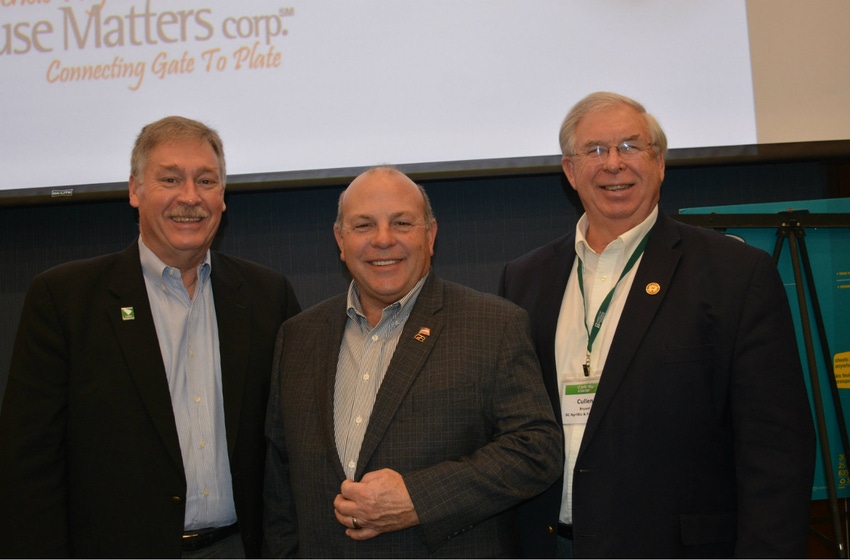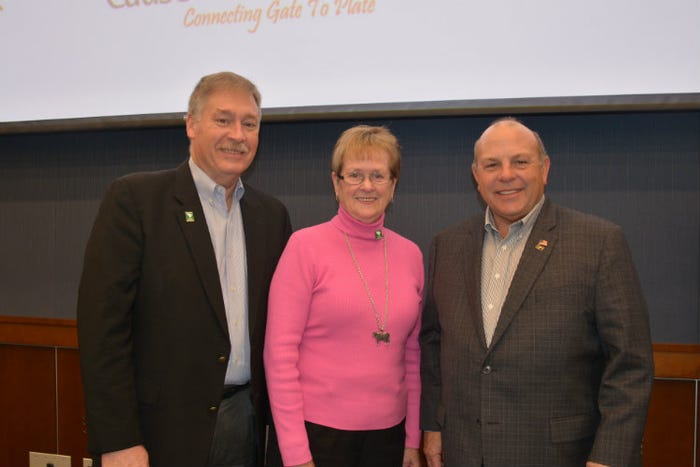
Agriculture faced a perfect storm in 2018, and while some of that storm has passed, much of it still remains in the new year, says American Farm Bureau Federation President Zippy Duvall.
Nuisance lawsuits, trade tensions, declining farm income and labor issues remain a challenge for agriculture in 2019 while farmers in the Southeast and other parts of the country dealt with natural disasters last year. However, Duvall said the good news is that an improved farm bill was passed and signed into law last year.
Duvall is a third-generation farmer from Greshamville, Ga. In addition to a 400-head beef cow herd for which he grows his own hay, Duvall and his wife, Bonnie, also grow more than 750,000 broilers per year. He previously served as Georgia Farm Bureau president and became AFBF president in January 2016
Speaking at the SC AgriBiz & Farm Expo in Florence, S.C., Duvall said the biggest problem facing farmers of every commodity and in every region is lack of labor. “If we don’t find an answer to our labor problems on the farm, we will continue to see farmers restricted from their ability to produce and expand,” Duvall said. “Our children, grandchildren and new people can’t come back to the farm if we can’t expand, and we can’t expand if we don’t have labor, so we are going to continue to work on that.”
Duvall said farm labor is related to border security. He said Farm Bureau supports a secure border, saying “we don’t care how they do it.” He explained that Farm Bureau has worked with Congress for the past 10 years for a workable guest worker for agriculture, but to no avail.
“They’ll say ‘we can’t do anything when it comes to immigration until we secure the border.’ For the past four years I’ve been saying ‘so let’s secure the border because I’m tired of hearing that excuse.’ We have to take that excuse away from them because if we don’t, we never will solve the problems with farm labor or immigration reform.”
Duvall said a 50 percent drop in farm income over the past five years is a major worry for agriculture.
“I tell groups that aren’t in agriculture, what if your boss decided to cut your check in half Monday morning? What would you do that week in order to able to supply your family what they need by Friday, and you get that check, and it is half of what it was. That’s what our farmers are facing,” Duvall said.
Tariffs and trade tensions with China remain a challenge in 2019. Duvall said Farm Bureau is working with the Trump administration to find a fix. Moreover, he said Congressional approval of the United States-Mexico-Canada Agreement (USMCA) is critical, but won’t be an easy chore.
Additionally, Duvall said all of agriculture needs to be wary of the nuisance lawsuits plaguing North Carolina hog farmers: “what’s in their backyard today, will be in your backyard tomorrow.”
“Everybody says they’re not suing the farmers, they’re suing the big companies. I’ve been growing chickens for 33 years. If I get sued for the smell of my chickens, you know what Pilgrim Pride is going to do? They’re going to depopulate my farm. If they depopulate my farm, my farm income leaves, but my debt is still going to be there,” Duvall said.
Finally, Duvall said a victory for agriculture last year was passage of the farm bill.
“To introduce a farm bill and get it passed in the same year, is almost unheard of. It’s been over 20 years since we’ve actually had that happen. We are very, very proud of our success in getting it passed,” Duvall said.
“This farm bill improves our risk management programs, it reassures us that we’re going to have crop insurance which is a big part of our risk management tools on the farm. It makes additional investment in trade promotion which we desperately need. It makes investment in our future by investing in research and development to keep us on the cutting edge. It also invests in beginning farmers, so this is a really good farm bill,” he said.
Despite the challenges and storms facing agriculture, Duvall said there is hope.
“My hope lies in what I see in Washington. You might think that sounds funny, but being there just about every week, my hope comes in an administration that gives us a seat at the table because we haven’t always enjoyed that,” Duvall said.

Discussing Farm Bureau issues at the SC AgriBiz & Farm Expo in Florence are from left Larry McKenzie, assistant to the president of the South Carolina Farm Bureau; Laurens County, S.C. Farm Bureau President and dairy farmer Marilyn Easter and American Farm Bureau President Zippy Duvall.
About the Author(s)
You May Also Like






